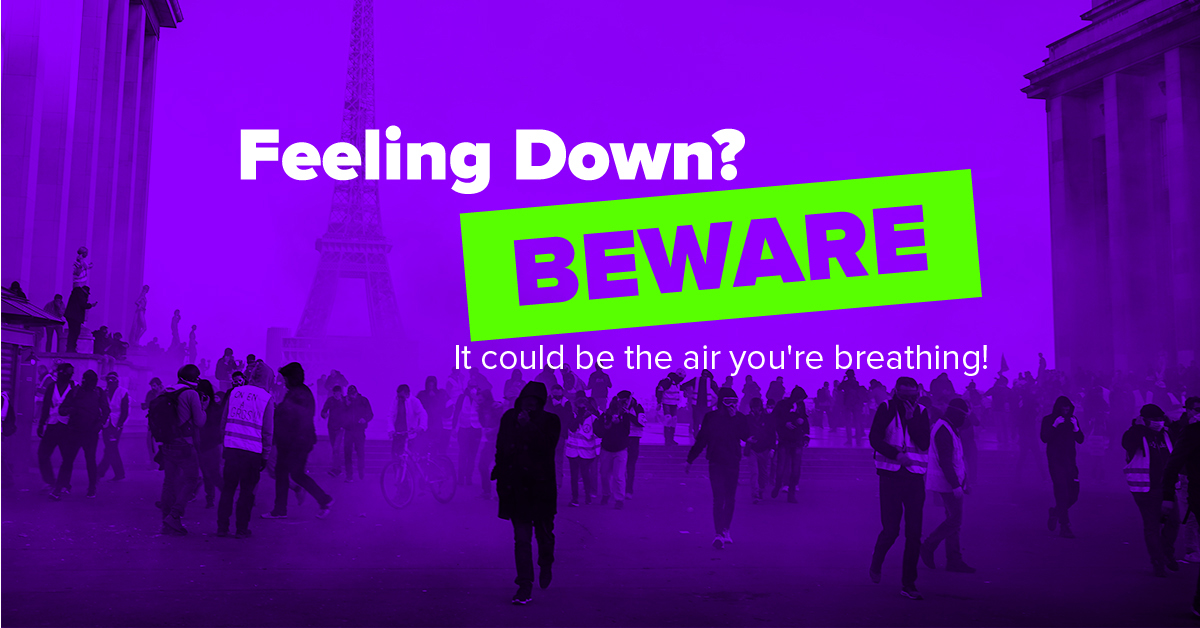Posted by Sherijan Ivan Dela Cruz on Jan 26th 2020
Feeling down? Beware—it’s the air you’re breathing!

Even the World Health Organization is taking this matter very seriously.
 Image by: Spectator LIFE.
Image by: Spectator LIFE.
If you think about the risks associated with air pollution, what comes first in your mind? We’d bet on respiratory illnesses. Are we correct? Of course, we are.
And you don’t have to wonder—it’s a bet backed by statistics. In 2016, outdoor and inside air pollution contributed to respiratory problems resulting in a staggering 543,000 deaths in children under the age of 5. But if we will account for the total number of cases around the world, you’d be shocked to know that people living with air pollution have higher risks of developing depression, or worse, committing suicide.
What are we looking at?
A systematic review of global data from more than a hundred countries reveals that cutting air pollution to the EU's legal limit could prevent millions of people from becoming depressed. This finding assumes that prolonged exposure to polluted air can cause depression, and scientists are determined to prove this beyond doubt.
While the fact that toxic air has the terrifying potential to damage every organ system in the body is well-established, this WHO-supported research has suggested that pollution may also affect mental health—and it’s particularly critical of the dreaded fine particulate matter: PM2.5
PM2.5s shouldn’t exceed 10 micrograms per cubic meter of air on average, according to the World Health Organization. The world’s countrysides have this average level of particulate matter. It’s a different story for the megacities, though, with PM2.5s reaching as high as 133 micrograms in Delhi, India for instance.
The researchers found that someone living in cities and suburbias for at least six months with twice the WHO's recommended limit for PM2.5s would have roughly a 10 percent increased risk of getting depression—and later on might lead to suicidal tendencies, than those who live in areas with cleaner air.
Understanding the risks
Isobel Braithwaite, head of the University College London (UCL)-led research, emphasized a very crucial point: “We’ve shown that air pollution could be causing substantial harm to our mental health, making the case for cleaning up the air we breathe even more urgent.”
 Image by: Medical Xpress
Image by: Medical Xpress
Another expert from the UCL team, Dr. Joseph Hayes verified Braithwaite's findings. "The evidence is highly suggestive that air pollution itself increases the risk of adverse mental health outcomes." Clearly, the risks are here to stay if further advocacy won’t push through.
Published in the journal Environmental Health Perspectives, the research used strict quality criteria to handpick data from 16 countries across six continents. With more recent research supporting this "alarming wake-up call", it's about time we educate ourselves and understand the risks that rip healthcare systems of the most impoverished nations of our world.
Notwithstanding those who live in developed countries like the US and UK, where fine particulate matters are at record-high. Air pollution in North America is purportedly linked with "extremely high mortality" in people with mental disorders and a quadrupled risk of depression in teenagers. Alarming? It’s a public health emergency.
How can you SAVE yourself and your family?
 Our Healthway Air Purifiers are among the best in the market.
Our Healthway Air Purifiers are among the best in the market.
Braithwaite explained that simply teasing out the links between pollution and mental health is only a "kick-start" because there is still a long way to go on reducing air pollution. "Knowing it [PM2.5] not only affects physical health but it could be affecting our mental health, which is something that does affect large numbers of people, I think adds to the weight of the argument for cleaner air and policies that achieve it," she added.
How, then, can you promote cleaner air and save not just your lungs but your mental state as well?
"We all need to do what we can to reduce our contribution to air pollution, whether that is walking or cycling," said the UCL research head. "We also need to be thinking about system change, meaning [creating] policies that help reduce pollutant output and controlling overall toxicity levels in the atmosphere." The researchers closed their study in pitching for a greener world, not only improving air quality but also promoting better mental health.
These are all long-term solutions, but what about the air you will breathe tomorrow? Air purification systems are excellent short-term solutions to the growing toxicity of our air. CWR Enviro's air purifiers can help protect you and your family from extremely harmful contaminants that permeate in the atmosphere—even fine particulate matters like PM2.5.
You can check out our air purifiers here.

